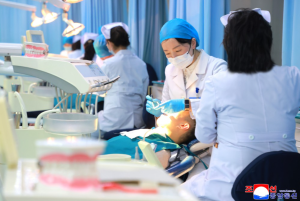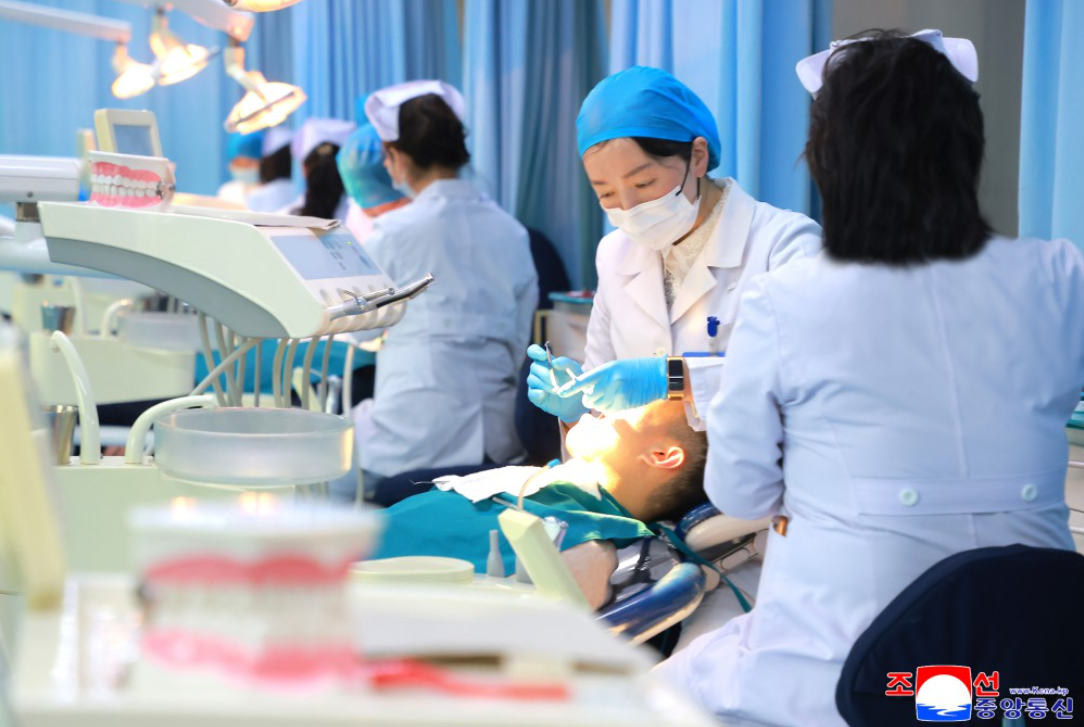 (Source: Korean Central News Agency)
(Source: Korean Central News Agency)
The Korea Health Policy Project (KHPP), a policy research group focused on healthcare on the Korean Peninsula, recently concluded a four-part webinar series to better understand the approach and attitude of North Korea (Democratic People’s Republic of Korea or DPRK) with regard to public health and international engagement. The series presented recent research on North Korea’s health care system, how this system responded to the pandemic, and what recent import data suggests about North Korea’s health priorities. It also discussed prior health engagement with the DPRK and the prospects for future cooperation in this space. Overall, the series highlighted the potential for health cooperation with North Korea to serve as an apolitical starting point for rebuilding relations with the DPRK, in ways that can be both beneficial to the North Korean people and the world, by enhancing global public health.
North Korea’s Overarching Engagement Strategy
One of the key insights to come out of the webinar series was the DPRK’s tacit preference for long-term development and capacity building programs over simple humanitarian aid provision. This has been a growing trend for some time, but has become even more pronounced in the post-pandemic era given the overall re-emphasis on self-reliance in DPRK propaganda and the push to improve the country’s resilience to external shocks.
In the public health sector, this trend has many implications. For starters, the DPRK’s health system is structured around tiered levels that stress the local doctors providing care. These doctors will often offer locally-sourced traditional medicines, and stress preventative care. Through my personal attendance at research symposiums held in Pyongyang, I have often seen research that focuses on ways for citizens to improve their health and health outcomes through their own means.
In the past, international health organizations have tried to implement mechanisms that provide aid, but North Koreans have frequently expressed a preference against from foreign-based strictly-aid approaches. Instead, the collaborations that have been most successful tend to include development and capacity building components such as constructing hospitals, treatment centers, and testing labs, expanding a telemedicine system to reach the outlying areas and provide care that is not otherwise available, and even providing surgical training for both urban and rural surgeons. Again, through personal attendance at research symposiums in Pyongyang, I have also seen the North Koreans develop their own medical implants, and internal production of medicine. This type of cooperation helps the country’s domestic capacity to address a myriad of public health challenges in the long term.
In fact, North Korea continues to see growth and expansion, sanctions notwithstanding, to improve their system. The analysis on the import data from China by the KHPP showed several items that indicate the country is finding a way to develop and improve its ability to meet medical needs of not only the residents of Pyongyang, but also the population-at-large. For instance, Chinese customs data demonstrate a prioritization of insulin imports since the pandemic, enough to cover the short-term needs of a large portion of the population—clearly beyond the amount required to treat the citizens of Pyongyang alone. We know that insulin has requirements for a cold-chain management system; the infrastructural implications of this import indicate a deeper level of commitment.
Health is one area that should remain apolitical and to which the DPRK has been active in international forums. It has gained a seat on the WHO executive board and has been signatory to resolutions from World Health Assemblies. It collaborates with major international health organizations to establish health priorities and plans for improving the health outcomes of its population, such as establishing the Medium Term Strategic Plan with technical assistance from the WHO, or building health facilities and vaccination programs with UNICEF. North Korea has a long track record of working to improve the level of medical care in the country, as demonstrated by its comprehensive national health plan .
Collaboration in the health sector can be both successful and sustainable as long as the DPRK is a respected partner in the process. And there are several indications that the DPRK places a high priority on improving its overall public health. In Pyongyang, we have seen several specialty hospitals being built focusing on women’s health, children’s health, eye care, rehabilitation, and a new general hospital being built, among other reforms.
A Proposal
One way to insulate health engagement with the DPRK from broader political trends is to establish a multi-donor trust fund specifically for public health development. Management of the fund could be conducted by internationally- and mutually-recognized health organizations to ensure normative standards of monitoring and evaluation and prevent any one body or country having undue influence over decision making. The goal of projects under this fund would be to improve medical care and enhance the DPRK’s overall public health environment—an important piece of the global public health landscape.
While financial channels and sanctions restrictions will all have to be taken into account, exemptions already exist for the provision of medical care to North Koreans. Greater consideration will be needed for more development-oriented components, such as medical equipment, infrastructure improvements, trainings and potentially educational exchanges and opportunities.
In the absence of bilateral relations between the DPRK and key states, such as the United States and South Korea, this trust fund could facilitate health cooperation and engagement as a way to build trust and cooperation in the meantime. To facilitate health engagement, KHPP recommends the following approach:
Opening a multi-donor, international trust fund to establish neutral financial territory that can be managed by independent international medical groups;
Working with the DPRK to develop its medical resources and level of care for the long-term benefit of the people and to strengthen the global public health landscape;
Removing financial and legal blockades that prohibit or impede collaborative efforts in the health sector that would allow a long-term plan addressing medical needs to be successful; and
Defining clear guidelines in the OFAC general license that allow fruitful engagement in the health sector for medically-focused groups.
By allowing medical and health care collaborations to be productive, the US can take the lead role in establishing a mechanism for trust-building. This method also allows the DPRK to exercise its sovereignty and ability to improve its overall level of health care for its people and address other areas of concern in outlying areas (nutrition, clean water, etc.). North Korea can re-establish activities and communications with the international community and slowly re-engage in the global arena. North Korea has already rebuked COVID vaccines sourced from US companies, and preferred Chinese-sourced options, presumably due to the political nature of such a request. The US is recognized as a primary antagonist by North Korea, and must utilize its position of global leadership if it is to be successful in modifying this role. The resolution of this geopolitical concern is dependent on the US rebuilding trust, and the key to unlocking this door is through depoliticized long-term health engagement and collaboration.
The world was reminded by the COVID pandemic of how countries cannot exist in isolation when it comes to matters of public health, no matter how robust any country’s health system may be. Building parity across the health systems of the world is necessary for building resilience against this transnational non-traditional non-selective threat and should not be contingent on the country’s political relations. This level of parity requires a level of trust between nations that is currently lacking. Being partners in a mutually beneficial goal through an independent trust fund will be a key tool for strengthening the global health landscape and creating at least one pathway for rebuilding trust and cooperation.
